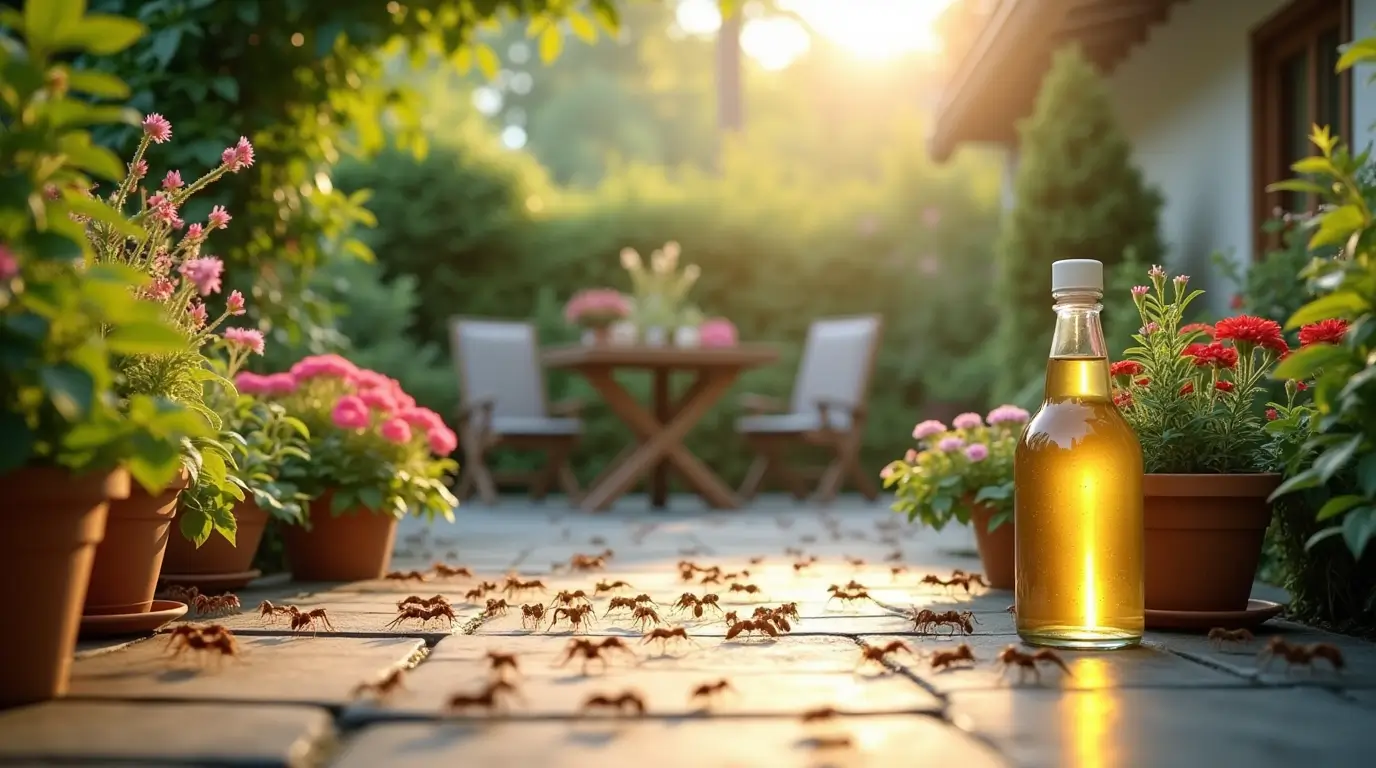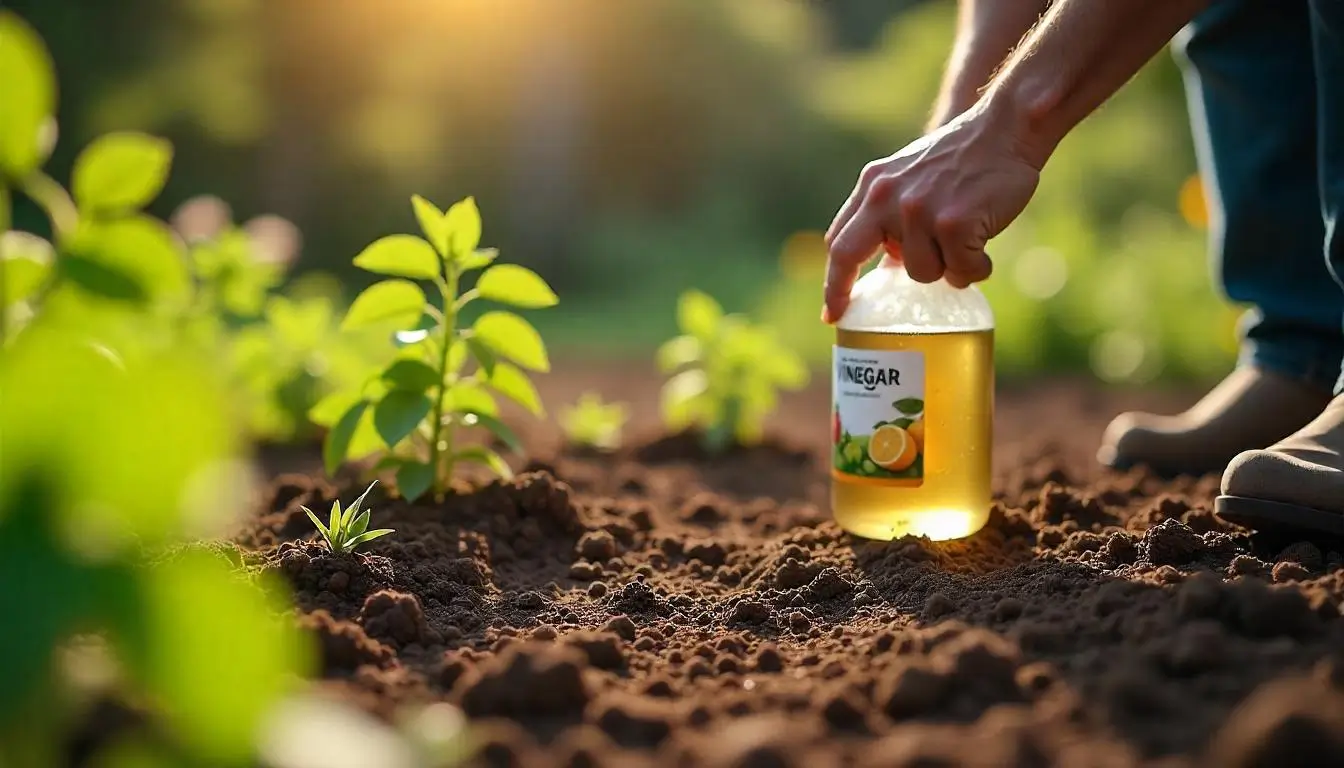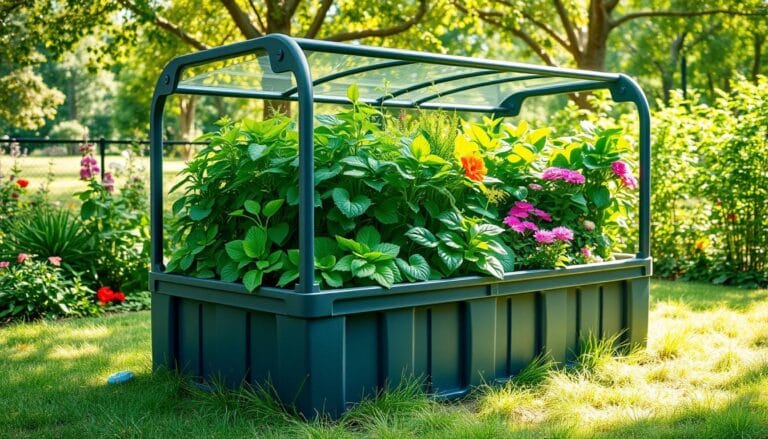Does Vinegar Kill Ants? 5 Proven Ways to Stop Infestations

Introduction
Does vinegar kill ants? Picture this: you’re enjoying a peaceful afternoon in your garden when suddenly you spot them – tiny invaders marching in a perfect line across your patio or, worse yet, trailing through your kitchen. Ant infestations can turn any garden sanctuary or cozy home into a battlefield overnight. But before you reach for harsh chemical solutions, there’s a simple, natural alternative sitting right in your pantry: vinegar.
Did you know that the same tangy liquid you use in salad dressings and pickling recipes has been used as a pest deterrent since ancient times? Roman soldiers used vinegar to clean their wounds and repel insects from their camps. This unassuming household staple has earned its reputation as nature’s pest control secret weapon for good reason.
What makes vinegar stand out among natural pest solutions is its perfect trifecta of benefits: it’s incredibly affordable (often costing less than $3 for a large bottle), completely eco-friendly (unlike chemical pesticides that can harm beneficial insects and contaminate soil), and surprisingly effective at both killing and repelling ants.
While diatomaceous earth might be celebrated for its long-lasting protection against crawling insects, vinegar offers something unique – immediate results with no waiting period and no messy powder to clean up afterward. Plus, you can safely use it around food preparation areas without worry.
Ready to reclaim your garden and home from these tiny invaders? Let’s explore how this kitchen staple can become your most powerful ally in the battle against ants.
Table of Contents
What Makes Vinegar a Powerful Ant Killer?
Who knew the same stuff you drizzle on your salad could send ants running for the hills? It’s true! Does vinegar kill ants? Absolutely—vinegar’s secret weapon is its acetic acid content, which packs a powerful one-two punch against ant invasions. First, it completely obliterates the scent trails ants leave behind to guide their colony mates to food sources. An ant without a trail is like a gardener without a shovel – completely lost! Second, that strong smell we humans find so pungent is downright offensive to ant sensory systems, making your home instantly less inviting.
The best part? While vinegar is a formidable opponent to ants, it poses no threat to your family, pets, or garden ecosystem. Why not give this pantry powerhouse a shot before splurging on expensive pest control solutions? Your wallet (and the beneficial insects in your garden) will thank you!
Why You’ll Love Using Vinegar to Kill Ants:
Eco-Friendly and Safe
Unlike chemical pesticides that leave harmful residues on surfaces and in soil, vinegar breaks down naturally without damaging the environment. It’s completely non-toxic, making it safe to use around curious pets, crawling toddlers, and edible plants in your garden. In fact, if you’re asking, “Does vinegar kill ants?” many have discovered that its natural properties can help deter these pests without resorting to harsh chemicals. You can confidently spray it near your herb garden or vegetable beds without worrying about contaminating your harvest. The peace of mind alone makes vinegar worth trying – no more reading warning labels or worrying about accidental exposure to harsh chemicals.
Affordable and Convenient
Let’s face it – specialized pest control products can get expensive, especially when you’re dealing with recurring infestations. Many homeowners often ask, “Does vinegar kill ants?” and the answer is yes—vinegar’s natural properties can disrupt ant trails and deter their return. Most households already have vinegar sitting in the pantry, eliminating the need for a special trip to the store. A gallon of white vinegar costs just a few dollars and can tackle multiple ant problems throughout the season. This wallet-friendly solution delivers impressive results without the premium price tag of commercial products. Plus, there’s no waiting for delivery or store opening hours when ants decide to crash your Sunday barbecue – your solution is already on hand!
Effective and Versatile
Vinegar works against various ant species, from tiny sugar ants to larger carpenter ants. Many homeowners ask, “Does vinegar kill ants?” and its versatility shines in multiple settings – spray it along garden paths where ants create highways, apply it to kitchen counters where they forage for crumbs, or use it as a barrier treatment around entry points. Unlike some chemical treatments that require specialized application for different species or locations, vinegar’s simple formula works everywhere.
When compared to chemical ant killers, vinegar doesn’t just mask problems temporarily – it actually solves them without the environmental damage, chemical residue, or potential harm to beneficial insects like bees and ladybugs that pesticides can cause.
Why not give this pantry staple a try in your battle against ants? You might be surprised at just how effective this simple solution can be!
How to Use Vinegar to Stop Ant Infestations:
Quick Overview:
Vinegar is truly a game-changer in natural pest control. It works immediately upon contact, requires zero preparation time, and delivers visible results within minutes. Beyond just eliminating ants, it doubles as a natural deodorizer, removing musty odors from areas prone to dampness and insect activity. The best part? Most vinegar ant-control methods take less than five minutes to prepare and apply – no complicated mixing, no special equipment, and no protective gear required. It’s truly the definition of an effortless solution.
Key Ingredients and Supplies:
To create your ant-fighting arsenal, gather these simple items:
- White vinegar or apple cider vinegar (white is stronger, but apple cider has a less pungent smell)
- Water
- Spray bottle
- Dish soap (optional, for enhanced effectiveness)
- Paper towels or cleaning cloths
Pro Tip: For particularly stubborn infestations, increase the vinegar-to-water ratio for a stronger solution. Consider investing in a few reusable spray bottles to keep pre-mixed solutions ready for immediate use throughout your home and garden.
5 Proven Ways to Use Vinegar Against Ants:
1. Vinegar Spray for Instant Ant Repellent
This all-purpose solution works wonderfully as both a contact killer and deterrent.
- Mix equal parts vinegar and water in a spray bottle.
- Spray directly on ants and along their trails.
- Wipe away any visible ant trails after spraying to disrupt their path.
✅ Pro Tip: Reapply every few days to ensure no new ants find their way in. For kitchen counters, spray at night and let it sit until morning for maximum effectiveness.
2. Vinegar Perimeter Defense
Create an invisible barrier that ants won’t cross.
- Pour undiluted white vinegar into a spray bottle.
- Apply generously along doorways, windowsills, and garden borders.
- Refresh the barrier after rain or heavy watering.
✅ Pro Tip: For outdoor use, focus on creating a complete perimeter around patios, garden beds, or outdoor eating areas for comprehensive protection.
3. Vinegar and Soap Ant-Killer Solution
This powerful combination provides enhanced killing power.
- Combine 1 cup vinegar, 1 cup water, and a squirt of dish soap.
- Spray directly on ants for a fast-acting, double-punch effect.
- The soap breaks down the ants’ protective coating while vinegar disrupts their senses.
✅ Pro Tip: This solution works best for visible ant trails rather than preventative use, as the soap can leave a slight residue.
4. Soak and Wipe Down Ant Entry Points
Target the source of your ant problem directly.
- Identify cracks, holes, or gaps where ants are entering.
- Soak a cloth in pure white vinegar.
- Thoroughly wipe down entry points, paying special attention to corners and crevices.
✅ Pro Tip: After application, stuff entry points with cotton balls soaked in vinegar for extended protection.
5. Vinegar Soil Treatment (Outdoor Only)
Tackle ant colonies at their source in your garden.
- Locate the ant nest by following trail patterns.
- Mix a solution of 1 part vinegar to 3 parts water.
- Pour directly onto anthill or nest area.
- Repeat daily until ant activity ceases.
✅ Pro Tip: Be sure to avoid plant roots, as concentrated vinegar can harm desirable plants. Apply carefully in the early morning or evening when beneficial insects are less active.

What to Pair with Vinegar for Maximum Pest Control:
For truly comprehensive ant management, consider complementing your vinegar treatments with these natural allies:
- Cinnamon: Sprinkle ground cinnamon along ant trails or entry points. Ants avoid crossing cinnamon lines, making it an excellent partner to vinegar barriers.
- Diatomaceous Earth: Apply food-grade DE in dry areas where vinegar might evaporate too quickly. This natural powder kills ants by dehydration and works continuously even when you’re not actively spraying.
- Citrus Peels: Place lemon, orange, or grapefruit peels near entry points. The strong citrus scent compounds the repellent effect of vinegar, creating a double-barrier system.
- Peppermint Oil: Add 10-15 drops to your vinegar spray for enhanced repellent properties and a fresher scent that masks the vinegar smell.
Top Tips for Success with Vinegar Ant Control:
Choosing the Right Vinegar:
White distilled vinegar with 5% acidity is most effective for pest control purposes. While apple cider vinegar can work, its milder scent and lower acidity make it slightly less effective, though more pleasant-smelling for indoor use.
Consistency is Key:
Ants may return if vinegar treatments aren’t maintained regularly. Remember that vinegar evaporates over time, especially outdoors. Successful ant control requires reapplication every 2-3 days initially, then weekly once the problem is under control.
Avoiding Plant Damage:
Always dilute vinegar used near garden plants to prevent leaf burn or root damage. Avoid direct application to plant foliage or soil surrounding delicate plants. For prized garden specimens, consider creating a vinegar barrier further away from the plant base.
How to Store Vinegar for Ongoing Ant Control:
- Storage: Keep vinegar in a cool, dark place to maintain its strength and effectiveness. Exposure to light can degrade acetic acid over time.
- Pre-Mixed Solutions: Prepare batches of your favorite vinegar solution in clearly labeled spray bottles for quick access during sudden ant appearances. Pre-mixed solutions retain effectiveness for up to two weeks.
- Seasonal Preparation: At the beginning of ant season (typically early spring), stock up on extra vinegar and prepare your defense strategy before the first scouts appear.
TERRO T300B and other commercial Indoor Ant Killer products have their place, but when you’re looking for a natural, child-safe option that doesn’t involve Ant Bait Stations, vinegar stands out as nature’s solution. While Pest Control companies might recommend Ant Traps containing harsh chemicals, this pantry staple offers Home Pest Solutions without the risks associated with standard Insect Killer formulations.
Unlike an Amazon Product that ships with warning labels and precautions, vinegar delivers Effective Ant Control without the concerns typical of Household Pesticides. Nature provides everything we need to keep our homes and gardens free from unwanted visitors – vinegar proves it!
Author’s Top Recepe Picks:
- Does Bleach Kill Ants? 5 Proven Ways It Works
- Does Vinegar Kill Ants? 5 Proven Ways to Stop Infestations
- How to Kill Carpenter Ants: 7 Proven Amazon Solutions
There are no reviews yet. Be the first one to write one.






